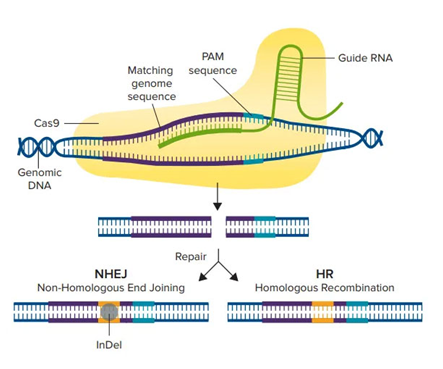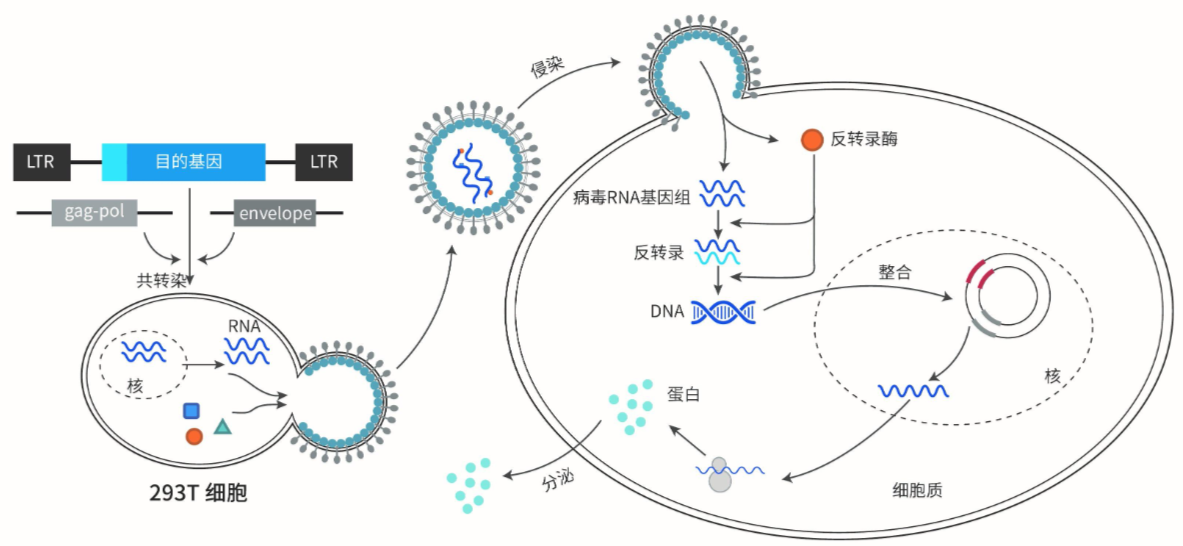- Cart 0
- English
Organoid CRISPR-Cas9 Gene Editing and Lentiviral Transfection
October 25, 2024
Clicks:1103
In recent years, organoid research has been very popular. There has been a surge in demand for organoid models in studies of signal transduction mechanisms and drug screening and sensitivity. One good experimental method is to use CRISPR-Cas9 gene editing technology to knock down or knock out genes in organoids to create models. Today, let's learn about CRISPR-Cas9 gene editing technology and lentiviral transfection methods.
In CRISPR gene editing technology, there are three most important components: crRNA, sgRNA, and Cas9 protein. crRNA forms a complex with Cas9 protein, and sgRNA guides the (crRNA/Cas9) complex to target specific DNA regions for directed DNA cutting, thus achieving the purpose of gene editing.

Figure 1: Schematic diagram of the CRISPR-Cas9 gene editing technology.
The CRISPR-Cas9 gene editing technology generally has three technical approaches: All in one plasmid transfection, viral transduction, and RNP complex delivery. The viral transduction method involves integrating the sgRNA, crRNA, and sequences expressing Cas9 protein into a virus, which is then used to infect cells. Compared to plasmid transfection, the advantage is that sgRNA, crRNA, and the expression of Cas9 protein can persist in the cells, thereby achieving a high level of gene editing efficiency.

Figure 2: Schematic diagram of lentiviral transfection in cells.
Many friends are very curious about the transfection methods for organoids. The lentiviral transfection of organoids is similar to cell transfection, and there are a few issues that need attention:
1. Do organoids need to be dissociated from the matrix gel during lentiviral transfection?
Considering the virus's penetration of the matrix gel and transfection efficiency, it is recommended to dissociate organoids from the matrix gel during transfection, resuspend them in appropriate culture medium, and then proceed in a well plate.
2. Do organoids need to be digested into single cells during lentiviral transfection?
The efficiency of lentiviral transfection is higher when organoids are digested into single cells. It is recommended to infect after digestion into single cells.
3. What is the appropriate duration for organoid transfection with lentivirus?The transfection time can be adjusted according to the actual experimental conditions, usually 12-36 hours, similar to cell transfection times.
4. Do organoids need to be digested into single cells during selection? If not, is it enough to dissociate them from the gel, or do they need to be in the matrix gel?Organoid selection does not require digestion into single cells. Selection can be done within the matrix gel, as most drugs can penetrate the matrix gel and act on the organoids.
Here are the steps for organoid transfection:
1. Collect organoids, digest them into single cells, and seed them into a 24-well plate at a density of 2×10^5 cells per well (the cell density can be adjusted as needed);2. Replace the original culture medium with 1ml of fresh organoid culture medium containing 6μg/ml polybrene (the concentration of polybrene can be adjusted as needed), add an appropriate amount of viral suspension, and incubate at 37℃;
3. (For cells sensitive to polybrene toxicity) After 4 hours, add 1ml of fresh culture medium to dilute the polybrene;
4. Continue to culture for 12-36 hours. If a few cells have adhered, gently detach them with a pipette, mix well, collect the cell culture medium suspension into a centrifuge tube (usually 6-8 wells as a group). Centrifuge at 300g for 5 minutes at 4℃, remove the supernatant, add about 1ml of organoid passage culture buffer (ABS9730) to a 1.5ml EP tube, and resuspend by vortexing;
5. Observe the volume of the collected tissue, add 25 times the volume of the tissue of matrix gel (ABS9495) to resuspend and mix well (operate on a metal ice box or ice);
6. Using a 24-well cell culture plate as an example, add 25ul of tissue-matrix gel mixture to each well to plate (operate on a metal ice box or ice), place the plated culture plate in a 37℃ incubator for 10-15 minutes to solidify the gel, and then add 500-750μl of organoid culture medium (returned to room temperature) for culture;
7. Wait for the organoids to show significant proliferation (usually 2-3 days), then replace with organoid culture medium containing the drug for selection (such as puromycin, etc.), organoids that have not been successfully transfected will lyse and undergo apoptosis, thus screening out successfully transfected organoids.
|
Item NO. |
Product Name |
Size |
|
1kit |
||
|
1kit |
||
|
Mouse Lung Organoid Culture Medium Kit |
1kit |
|
|
Human Breast Cancer Organoid Culture Medium Kit |
1kit |
|
|
Human Endometrial carcinoma Organoid Culture Medium Kit |
1kit |
|
|
Human Colorectal cancer Organoid Culture Medium Kit |
1kit |
|
|
Human Lung Cancer Organoid Culture Medium Kit |
1kit |
|
|
1kit |
||
|
Human Pancreatic Cancer Organoid Culture Medium Kit |
1kit |
|
|
Human Ovarian Cancer Organoid Culture Medium Kit |
1kit |
|
|
Human Liver Organoid Culture Medium Kit |
1kit |
|
|
1kit |
||
|
Mouse Gastric Cancer Organoid Culture Medium Kit |
1kit |
|
|
1kit |
||
|
Mouse Breast Cancer Organoid Culture Medium Kit |
1kit |
|
|
Mouse Hepatocarcinoma Organoid Culture Medium Kit |
1kit |
|
|
1kit |
Absin provides antibodies, proteins, ELISA kits, cell culture, detection kits, and other research reagents. If you have any product needs, please contact us.
|
Absin Bioscience Inc. |
 Follow us on Facebook: Absin Bio Follow us on Facebook: Absin Bio |
